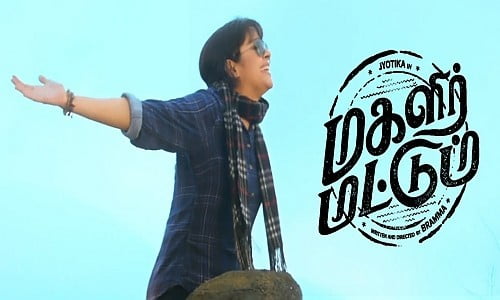
Magalir Mattum (Eng: Ladies Only) is a 2017 Indian Tamil drama film written and directed by Bramma, as his second venture after Kuttram Kadithal (2015). The film features Jyothika, Saranya, Urvashi and Bhanupriya in the lead roles, while Nassar and Livingston play pivotal roles. Magalir Mattum narrates the story of three female school friends who reunite after thirty-eight years, despite the pressures put upon them by the men in their lives. Produced by Suriya and featuring music composed by Ghibran, the venture began production in July 2016 and had a theatrical release on 15 September 2017. Magalir Mattum received positive reviews.
Magalir Mattum begins in 1978, when we see three girls — Gomatha, Rani Amirthakumari (Shobana Karthikeyan) and Subbulakshmi (Nivedhithaa Sathish) — sneaking out to watch a movie, all the while debating if it’s a Rajini film or a Kamal film (it is both, for the movie is Aval Appadithaan).
The action then abruptly cuts to the present, to Gomatha (Urvashi). Her husband is no more, and her son Surendar (Madhavan, in a cameo) works in Qatar, while she lives with his girlfriend-fiance, Prabha (Jyotika), a documentary filmmaker.
Prabha is intrigued by Gomatha’s memories of her long-separated college friends. As in Pa. Pandi, it is Facebook that helps trace long-lost individuals.
Rani (Bhanupriya) is now in Agra, and her husband (Nasser) and son (Pavel Navageethan) are politicians hoping to win an upcoming local body election. Subbu (Saranya Ponvannan), a beautician, is in a loveless marriage with Mangalamoorthi (Livingston), who still pines for a lover from his past.
And Prabha plans a reunion for the three by way of a three-day trip…
Feminist, filmi and feel-good, that’s Magalir Mattum. The film never shies away from wearing its feminist credentials and repeatedly points out how women and their dreams get trapped in the “maayajaala jail” called marriage. We first see this spelt out in the form of a housewife’s rant in Prabha’s documentary (titled The Great Indian Housewives). And we keep getting the ‘message’ in the form of Subbu and Rani. But this is also where the film is on shaky ground. The men in Magalir Mattum are conveniently less defined. Like 36 Vayadhinile, this film, too, is content to show men who treat their wives and mothers as servants to drive home the point that women deserve better.
It also creates an impression that it is only the earlier generation of women that faced issues of discrimination and this generation has it quite good, if you are to go by the character of Prabha, who is pretty much an independent woman. And this feels quite misleading. More than being a character, Prabha seems like a catalyst — a storytelling device. We don’t really get an insight into her. “Manasukku pudichavana kalyanam pannanum, manasukku pudichavan kooda vaazhanum. Adhu dhaan real liberation,” Prabha says at one point, and it feels like a rather simplistic defining of the views of this crucial character.
The film’s set-up is quite filmi, more Hollywood indie movie than rooted drama. The film doesn’t care much for realism, unlike Bramma’s earlier effort, the hard-hitting Kuttram Kadithal, and remains content with amusing us. Not that there is anything wrong in a movie aspiring to be a wish-fulfillment fantasy, but the plot points here are somewhat predictable — a son who realises how badly he has been treating his mother, a husband who finally admits that his wife deserves better, flashbacks to show us the friendship that existed between the three women…
Still, the feel-good factor in Magalir Mattum overrides many of these niggles. The film manages to walk a fine middle ground between lecturing and showing us the inequality that exists in our society. It is also not blatantly manipulative, and the emotional moments show us that its heart is in the right place (Ghibran’s punchy songs and score keeps letting us know that the intention is to celebrate women). The actors are all endearing, and the chemistry between the three senior actresses especially (their characters mirror the onscreen personas we have come to associate with them) easily conveys that they could have been thick friends in the past. And Jyotika, who looks younger, never oversells Prabha. Both she and Bramma realise that the real protagonists here are the three women and keep Prabha from dominating the film. In one scene, Rani remarks that she hoped that she would at least be a supporting character in her own story, but that was not to be. However, Jyotika and Bramma show that it is possible for every woman to be a heroine! This is also their biggest achievement.
Directed by Bramma
Produced by Suriya & Christy Siluvappan
Written by Bramma
Starring Jyothika, Saranya, Urvashi, Bhanupriya
Music by Ghibran
Cinematography S. Manikandan
Edited by C. S. Prem
Production 2D Entertainment & Chris Pictures
Distributed by Sakthi Film Factory
Release date 15 September 2017
Running time 140 mins
Country India
Language Tamil


Visitor Rating: 2 Stars